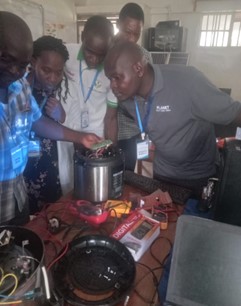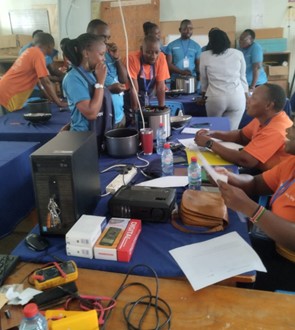
- Date
- 2nd January 2025
- Categories
- Repair and Maintenance
By Syprose Ochieng (Gamos East Africa), George Ayoma (Ramogi Institute of Advanced Technology), Kennedy Makori (Ramogi Institute of Advanced Technology) and Dr Jon Leary (Gamos East Africa).
Introduction
This blog highlights the inaugural training on repairing and maintaining of electric pressure cookers held at Kisumu eCooking Hub, hosted at the Ramogi Institute of Advanced Technology (RIAT) From September 26th to 30th, 2024. The training program focused on the repair and maintenance of electric pressure cookers (EPCs). This training was supported by the Modern Energy Cooking Services Programme and Energizing Development Programme under GIZ (EnDev).
The Kisumu eCooking Hub is one of four hubs established with support from the Modern Energy Cooking Services (MECS) programme, in collaboration with Africa Centre for Technology Studies (ACTS), Clean Cooking Association of Kenya (CCAK), Kenya Power (KPLC), and Gamos East Africa (GamEA Ltd). These hubs serve as focal points for capacity building, training, and awareness creation about eCooking thereby accelerating adoption of eCooking within the communities. They also serve as last-mile distributors of eCooking appliances to the least-reach communities, particularly in rural and peri-urban areas.
The training saw over 18 eCooking champions equipped with essential skills in appliance maintenance. It was structured into two main components; part one covered the basics of electric pressure cookers, safety precautions, electricity fundamentals, electronics, understanding the functionality of EPCs, and diagnostic procedures. Part two dived into more advanced topics, including repair techniques, troubleshooting, preventive maintenance, legal and ethical considerations, customer service, and business aspects. Practical applications and case studies were also integral parts of the course.


Why Training Matters for the eCooking Sector
In the pursuit of accelerating adoption to modern energy solutions across Kenya, the role of Electric Pressure Cookers (EPCs) has become increasingly significant. EPCs offer a clean, efficient, cost-effective way of cooking that not only addresses the energy needs of households and institutions but also contributes to environmental sustainability by reducing reliance on biomass and other traditional fuels. However, this can only be realized if they are properly maintained and repaired. This is why the recent repair and maintenance training of community champions in Kisumu plays a pivotal role.
This hands-on course aimed to address the crucial role of repair in extending the lifespan of e-cooking devices, reducing electronic waste, and enhancing user confidence. Proper repair and maintenance not only promote sustainability but also create local job opportunities, improve accessibility, and ensure the efficient functioning of these devices.
As more households in Kisumu and beyond transition to electric cooking, ensuring that users have access to reliable repair services becomes critical. The training of community champions in the repair and maintenance of these devices addresses this need head-on by empowering local champions to provide essential services within their communities.
This training will not only create a network of skilled individuals who can support EPC users but also ensures that the adoption of eCooking is sustainable.
Additionally, in a country with higher unemployment rate among the youth, training local community champions will contribute to job creation and skill development at the grassroots level leading to greater economic empowerment.

Recommendations
The Need for Replication: While the success of the Kisumu training is encouraging, it is essential to replicate these initiatives across other regions in Kenya and beyond. The promotion of electric cooking is ongoing across the country, and as adoption grows, so does the need for accessible repair and maintenance services. Creating a widespread network of trained community champions will ensure that the benefits of eCooking are felt more broadly, especially in underserved areas.
Integration into Curriculums: Incorporating repair and maintenance training into existing educational curriculums can further strengthen this network. By embedding these skills within technical and vocational education programs, Kenya can cultivate a new generation of skilled professionals who are prepared to support the growing clean cooking sector. This would not only enhance the sustainability of eCooking initiatives but also ensure that these skills are passed on to future generations.
Integration of the trained champions within the appliance distributors systems: The champions need to be integrated into the distributors’ systems so that their skills can be formally recognized. Currently, most distributors have their own repair and maintenance teams, so without this recognition, the challenge remains. The champions are eager for the partnerships that will emerge from this training, allowing them to apply their skills without risking clients’ warranties.
Scaling Up Training for Repair Technicians and Champions: To address the growing demand for repair and maintenance services, there is a need to train more repair technicians and community champions. Expanding this skilled workforce will ensure that communities have reliable support for eCooking appliances, especially in areas where such services are currently lacking. Prioritizing training in underserved regions will help create an equitable distribution of expertise, strengthening the clean cooking ecosystem.
Conclusion
The repair and maintenance training at the Kisumu eCooking Hub marks a key step in ensuring the sustainable use of electric pressure cookers (EPCs) in Kenya. By equipping 18 eCooking champions with essential skills, it has strengthened local capacity to support the growing adoption of clean cooking solutions.
This initiative demonstrates the critical role of repair and maintenance in sustaining eCooking use while creating jobs and economic opportunities at the community level. Replicating such trainings across regions, integrating them into education curriculums, and fostering partnerships with distributors will further amplify their impact.
This training sets a strong foundation for advancing eCooking adoption, paving the way for a future where clean and efficient cooking is accessible to all.
***************************************************************************************************************
Featured Image: eCooking champions at GIZ office before heading to RIAT for the EPC repair and maintenance training. Photo Credit: GIZ-EnDev, 2024.